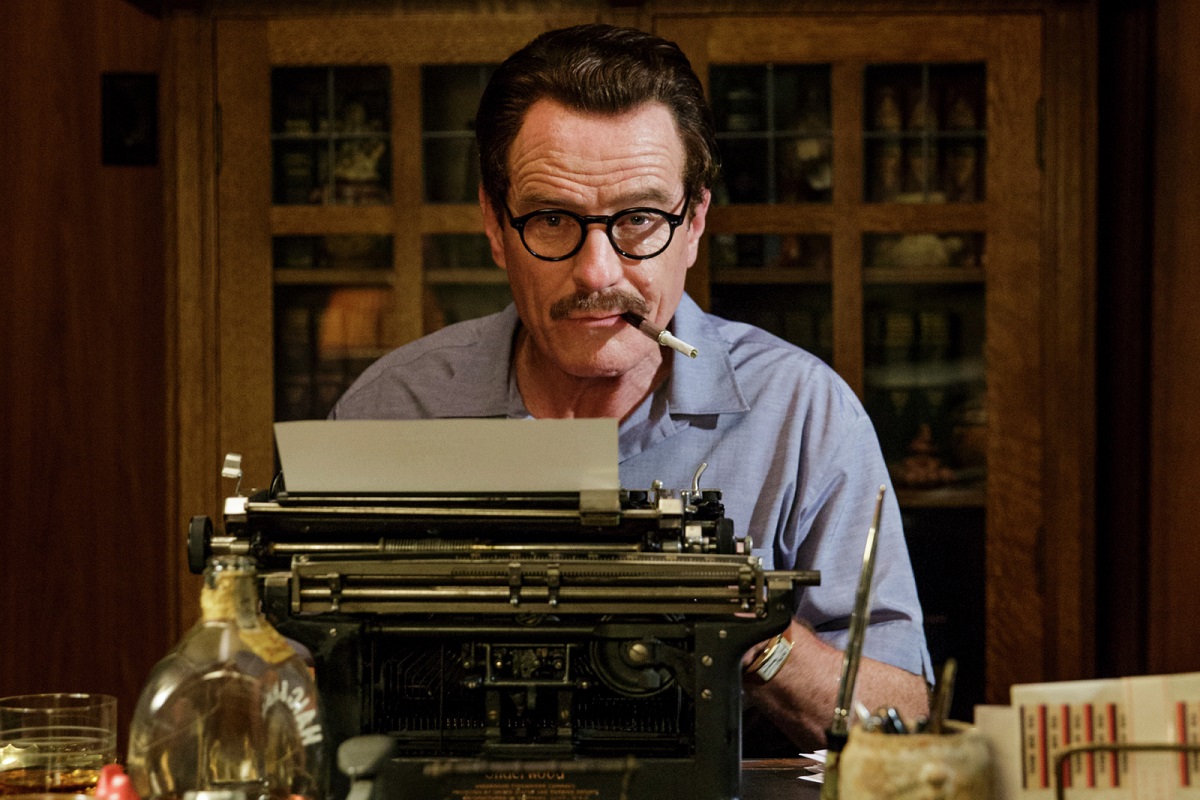Dalton Trumbo (Bryan Cranston), after being sent to prison,
with his career destroyed by the blacklist, is brought a script by Kirk Douglas
(Dean O’Gorman). The matinee idol tells him that he’s attached to the project but
that the massive screenplay for “Spartacus” needs some serious work. He says something that
Trumbo will quote later about another script—“There’s a good story in there somewhere.” Rarely does a film give
you such a distinct quote to so easily apply to itself. Jay Roach’s “Trumbo” contains an undeniably strong
story at its core, and Cranston does nothing wrong here, but the film feels artificial and staged when it needs to feel heartfelt and passionate. It’s one
of those works that, from scene one, is telegraphing its sense of importance to
the viewer. Every line, every scene, every beat is weighed down with a sense
that the filmmakers value message over character, period detail and even
filmmaking. The message of Trumbo’s story—that we should never punish people
for that which they believe—is a timeless one, and one that bears repeating
throughout the years in various forms of fiction. But Roach and screenwriter
John McNamara’s approach is leaden, thumping and pushing viewers to its themes
instead of letting them come organically.
From the very beginning, storm clouds are on the horizon for
screenwriter Dalton Trumbo. It’s mere minutes into the film before his daughter
asks, “Dad, are you a Communist?”
Newsreels of Trumbo rallying protesting workers in Hollywood play before a film
and the writer gets doused in sweetened beverage in the lobby afterwards. The
tide is turning as the Cold War intensifies, and the word Communist takes on
new meaning for Americans. It is not a different belief system, but that which
will take us down from inside. The Red Scare is fueled by hatred and
misunderstanding, represented by several people in “Trumbo,” including Hedda
Hopper (Helen Mirren), who uses her column and clout to force studios to fire
Communist screenwriters, and even John Wayne (David James Elliott), who
preaches intolerance for anything anti-American. Trumbo and his Communist friends,
including writer Arlen Hird (Louis C.K.) and Edward G. Robinson (Michael
Stuhlbarg), plan to fight back. They refuse to answer questions in front of
HUAC, hoping that their case will rise all the way to a liberal Supreme Court,
where they will be vindicated. In the middle of their journey, a justice dies,
and they know they’re in trouble, as the political balance will now shift. In fact, Trumbo and other members of the
Hollywood Ten are sent to prison for contempt, and their home lives and careers
come tumbling down.
When Trumbo emerges from his incarceration, it is to a completely
different world. No producer is willing to put his name on a screenplay. The
movie won’t get made if people know Trumbo wrote it. So he starts to work
behind the scenes, not only because he’s still got the immense talent to do so,
but because he needs to feed his family (Diane Lane plays his wife, Elle
Fanning his now-grown daughter). He essentially turns his brood into a script
doctor workshop, covertly receiving scripts, working on them (often in his
bathtub), and then sending them back via messenger. He does his most work with
the King Brothers (John Goodman and Stephen Root), helping tweak their B-movie
cavalcade. He also happens to write “Roman Holiday,” which he gives to a
colleague (Alan Tudyk), which wins the Oscar for Best Screenplay, and “The Brave
One,” which he writes under a pseudonym, and wins as well. It’s not until Kirk
Douglas and Otto Preminger come to Trumbo that it looks like he may finally be
able to emerge from the shadows.
“Trumbo” is about freedom of belief. It needs to be
passionate, intellectually engaged and confident. I’m not sure if Roach was the
wrong fit or McNamara the wrong writer, but one never senses a pulse in “Trumbo.”
It’s missing the human element, the beating heart that kept Trumbo, and others
like him, going. Dialogue is stilted, forced and Hollywood. There are a few
scenes between Cranston and Louis C.K. in which it feels like we’re actually
watching two friends relate, but too much of “Trumbo” is lacking that humanity.
More than half the dialogue is thematically purposeful. This is one of those
scripts in which people talk about what they’re doing and why they’re doing it
in nearly every scene—you know, like no one in real life.
It’s also a fatal mistake to frame the film as flatly as cinematographer Jim
Denault and Roach chose to do so. Some people have accused it of looking like
an HBO movie, but films like “Olive Kitteridge” and “Mildred Pierce” had a much
stronger visual language. This film has none. It is box framing, pointing the
camera in the direction of the action.
The Red Scare and the Hollywood blacklist are shameful chapters
in this country’s history. Lives were destroyed over paranoia and belief. It’s
a story that’s not taught well in schools, and a film like “Trumbo” could bring
it to a wider audience. I do believe there’s value in learning from our
mistakes as a country. And writers will always fascinate us, especially those
for whom it would have been so easy to give up, but they chose not to. What
drove Trumbo to keep writing when it felt like the forces pushing against him
were unstoppable? The film that bears his name never answers the question satisfactorily.
Still, there’s a great story in there somewhere.












